5 Things I Learned From Going On A Saga Walking Holiday
What a week on Gozo with a group of 70 and 80 year-olds taught me about life and ageing.
Looking Sideways is proudly ad-free and reader and listener supported. Thanks to all my paid subscribers, who help keep the podcast and newsletter free for everybody. And congrats to Ben who won a pair of Danner boots for the best comment in last week’s Open Thread on Sustainability with Hugo Tagholm.
This week, I’ve set up a 7-day Flash Sale for new paid subscriptions! Click the link below to sign up and get your first two months free.
One idea that stayed with me from Robert Macfarlane’s book Underland (which I still haven’t managed to finish) is that humans find it almost impossible to show compassion for the future.
“To think ahead in deep time runs against the mind’s grain”, as Macfarlane puts it, in typically grandiose style. “Beyond a hundred years even generating a basic scenario for individual life or society becomes difficult, let alone extending compassion across much greater reaches of time towards the unborn inhabitants of worlds-to-be. As a species, we have proved to be good historians but poor futurologists”.
It’s an interesting idea. That the past, however distant, engenders empathy, while the future, even close at hand, is fundamentally difficult to emotionally visualise.
I wonder if this tendency is why it’s so difficult to imagine yourself as an older person, and why we all romanticise our teenage selves. I’ve been thinking about this because I’ve just spent a week on what was essentially a Saga walking holiday on the Mediterranean island of Gozo.
A Saga holiday, for the uninitiated, is an organised group holiday for older people, with guests typically in their 60s, 70s and 80s. (OK, this one was organised by a company called HF, but nobody has heard of them, so for the purposes of this blog I’m going with Saga). This one was a guided, week-long walking holiday on the Mediterranean island of Gozo.
Of course, whenever I mentioned this to friends in the lead up, everyone laughed. Indeed, I played it for laughs myself, as you do. Hell, the clickbaity title of this blog is playing it for laughs. And yet, in the end, the trip completely confounded my expectations. I ended up having a brilliant, life-affirming time - and not just because I spent the week with just my Mum and my sister for the first time in what must be over 30 years.
So much so that over the course of the week, I began to realise the trip was making me rethink my view on getting old. After mulling it over on the journey home, I thought I’d jot down a few thoughts about that for this blog.
1. Life is really many lives
One reason I love the ‘whole life’ novels of William Boyd such as Any Human Heart is because they confront the varying vicissitudes of a full human life so unflinchingly and entertainingly. Think of the varying fortunes of Cashel Greville Ross in Boyd’s The Romantic, or the hilarious and poignant twentieth-century-straddling artistic struggles of the colossally self-absorbed John James Todd in The New Confessions.
These stories offer the important reminder that every life will go through phases of success, failure, love, loss, heartbreak, triumph, sickness and, finally, death. And getting to hang out with a bunch of people who’ve experienced this, and come out smiling, was one reason why I was so inspired by this past week.
Take Shirley, for example, who I sat next to one evening at dinner. We were discussing our working lives, and after a while it dawned on me that I was speaking to somebody who’d had a rather extraordinary career path. “Well, I’ve actually had three careers”, as Shirley put it at one point.
She’d been a successful journalist and broadcaster at at the BBC, before setting up an agency that makes films for organisations such as the Heritage Lottery Fund. Then, in her 60s, inspired by her parent’s Second World War tales, she started writing novels. Today, in her 70s, she’s the award-winning author of best-selling books about ‘the amazing women in World War II’, which she’s currently banging out at the rate of one a year.
These fluctuating phases, and how we respond to them, are what really define our lives. Thanks for the reminder, Shirley.
2. The future you imagine is scarier than the reality
Perhaps it’s because we’re all in our 30s, 40s and 50s, and our parents are ageing, but among my friendship group there’s a lot of talk about growing old at the moment. And none of it is that positive. Swapping stories about sick and elderly relatives, and secretly imagining a future of infirm old folks and grim care homes, seems to be a common theme.
When you think about it, our tendency to retreat into catastrophising cliche when considering the onset of old age is probably because, as a society, we are really, really bad at maturely confronting the realities - both positive and negative - of age, sickness, and death.
That’s one reason why I found the book Being Mortal by Atul Gawande so compelling when I read it a few years ago. In that book, Gawande, a surgeon, writer and public health researcher, basically argues that modern medicine is keeping people alive way longer than they should be. As well as the obvious ethical quality-of-life issues this has engendered, the wider societal consequences have meant that we’ve lost touch with our traditional relationship with old age, death and sickness, which used to be much more acknowledged phases of our lives.
Instead, we park these everyday realities behind a mental curtain, pretending they won’t happen to us, until the day we have to deal with them - and find ourselves woefully emotionally underprepared.
So what a tonic to have my own particular preconceptions over-turned, and to be pitched into the middle of a vibrant, perma-stoked group of cheerful oldies; all happily leading their best lives while subverting these hackneyed views about the travails of late-life.
It was yet another reminder that stereotyping has a lot of answer for - especially when it comes to getting old. And that, collectively, we could all really do with healthily reframing the entire business.
3. Be more Brian
One of the things some listeners seems to have found so irritating about my conversation with Steven Kotler is the fact that his entire Gnar Country schtick can basically be boiled down to one massively overused phrase, beloved of life-hackers and fitspo influencers the world over: ‘use it or lose it’.
As one listener put it, his problem with Kotler’s pitch was that it was “…the bleeding obvious repackaged….I think that’s what jars - the promise of ‘just buy my book and you’ll discover the hack’. It’s no hack, it’s hard graft, prioritisation & sacrifice. Impressive & inspiring, but much harder to package and sell”.
Perhaps I should have just interviewed octogenarian Brian instead, who made the same case as Kotler much more eloquently and compellingly (and unwittingly) during Thursday’s 17km walk around Gozo’s west coast.
All week, our volunteer guide Kevin (himself a wry, spry 6’2” 72 year-old) had been hyping Thursday’s walk as the toughest on the itinerary, with the introductory 200-metre scramble up the vertiginous cliff that looms over the village of Xlendi a particular challenge. I was dubious, to be honest. How hard could it be?
The truth was: trickier than I expected. Set against the pretty dramatic azure backdrop of Xlendi cove, it offered some decent exposure and one section of out-and-out, hand-over-fist scrambling. I was at the back helping my Mum over some of the trickier sections, when I noticed Brian (who I’d assumed was in his mid-60s) taking it very steadily and slowly at the back. My sister Jo hung back to give him a hand while we waited at the top.
As he came up the final section, Jo looked at me in awe: “Did you know Brian is 82?!”
17 hard kilometres later, as we trudged into Victoria, the Gozan capital, my admiration for Brian had increased tenfold. Over a pint, I asked him how he’d found it. ‘Fine, although I think we could have taken it a little easier and enjoyed the scenery a bit more!”
I thought back over the week, how over challenging daily walks of between 15 and 18 kilometres each day, Brian had been merrily cruising along, blissfully unaware of bogus sideways flow-science and any talk of ‘the art of high performance ageing’, powered instead only by his trekking poles and a cheery determination to surmount any challenge at his own pace.
The lesson? Be more Brian.
4. Social contact is life
We all instinctively recognise loneliness as an unpleasant and debilitating social experience. But new research shows that loneliness has a much more significant impact than we’d previously realised. Recent studies have linked it to everything from Alzheimer’s to Type 2 diabetes, and have found that prolonged bouts of loneliness can actively shorten your lifespan. Social bonds, it turns out, aren’t just important for your mental health. They impact your physical longevity as well (*dons Steven Kotler hat*).
And as my own (of course, entirely subjective) experience on this trip showed, the chance to participate in a ready-made sense of community seemed to be a key driver of this entire experience.
I was there with my Mum and sister to celebrate my Mum’s big 70th birthday, as part of a 25-strong group. I soon realised that the vibe is a little like posh youth hosteling for grown-ups. Everyone stays in the same very nice hotel together, eats together, walks together and socialises together. For some guests, the importance of this hyper-accelerated social contact soon became apparent.
Like June, who quickly became my favourite walking companion on the daily rambles. June’s husband had died a couple of years previously after 50 happy years of marriage, so she was using this and other HF trips to get back out there. As June told me bittersweet stories of their long, happy and fulfilled life together, I was in awe at her equanimous perspective, and the way she’d recognised that pushing herself far out of her social comfort zone on a trip like this was going to be a key part of her grieving and recovery process.
Or the brilliant Anne, who’s husband had died suddenly when they were both in their forties, and who’d since used her trips as a HF volunteer leader to tick off an enviable list of round-the-world travels, while also creating a thriving real-life social network for herself.
After speaking to both of these amazing women over the course of the week, the importance of the social bonds I currently take somewhat for granted became even more apparent.
It seems like working hard at your friendships won’t just increase the number of birthday Likes you get on Facebook each year. It might even help you live longer.
5. Assumption is privilege
Of course, not everything went this smoothly. As with any group, there were a few clunkers who demonstrated some of the less flattering consequences of ageing: assumption, social suspicion; a worldview frozen in aspic, pre 1962.
There were overheard grumblings about feckless daughters and nieces. The occasional bemused, catatonic comment about these bloody confusing trans kids. And more than one woefully misjudged reference to the idea that ‘we’re all supposed to apologise for slavery now’.
Listening to these very white, very privileged and extremely middle-class people amuse themselves over these exchanges, the thing that gave me the most pause - apart from the more obviously offensive stuff - was the cast-iron certainty that everybody in the group would agree.
This, I realised, is privilege at play in real-time; when you’re so used to seeing your opinions confirmed by society (even the objectionable ones), the thought that somebody might actually disagree with or be uncomfortable with your view doesn’t even cross your mind.
And when you think about it, this type of mildly toxic assumptive behaviour is everywhere. At the local level, it’s the lads in the five-a-side (or even the Met Police Firearm Unit, come to think of it) WhatsApp group cheerfully sharing sexist and racist memes with nary a care in the world. At the wider level, it’s the nudge/nudge wink/wink, “Come on, this is what all ‘fair-minded’ people think” dogwhistle of a politician cynically pandering to their base.
This tendency is also how privilege solidifies into impenetrable, exclusionary status quo. If you’re in that same group, and enjoy the same privilege, it can be difficult to see the problem, as demonstrated by the confused, even hurt expressions staring back at me when I gently pushed back on some supposedly mild, ‘bantering’ transphobia one morning. For the actual fellow human beings personally impacted by such insensitivity, the myriad issues with this level of privileged assumption are rather more obvious.
Which is why it’s probably good to listen to the person for whom challenging this status quo DOES carry great risk. Otherwise, conflict, division and prejudice can and usually will flourish in the resulting subtle and, at times, barely discernible gap.
These interactions made me realise something important: at the basic level, empathy can simply mean NOT assuming somebody agrees with you, making space for people to espouse a different point of view - and being prepared to listen. Apparently, that can be harder than it looks.
So there you go, that was my Saga holiday experience. Hope you enjoyed it! Any thoughts? Let me know👇



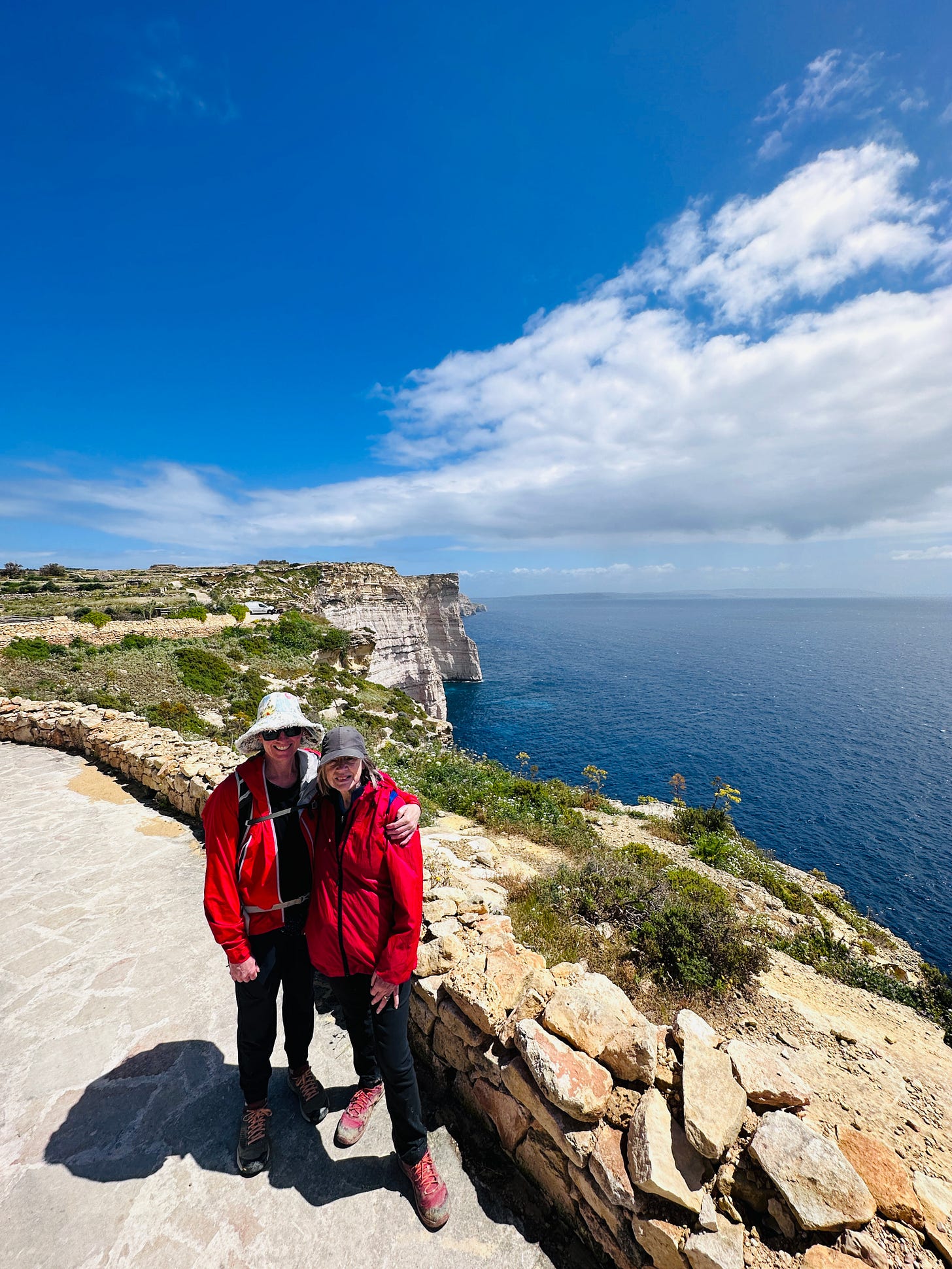



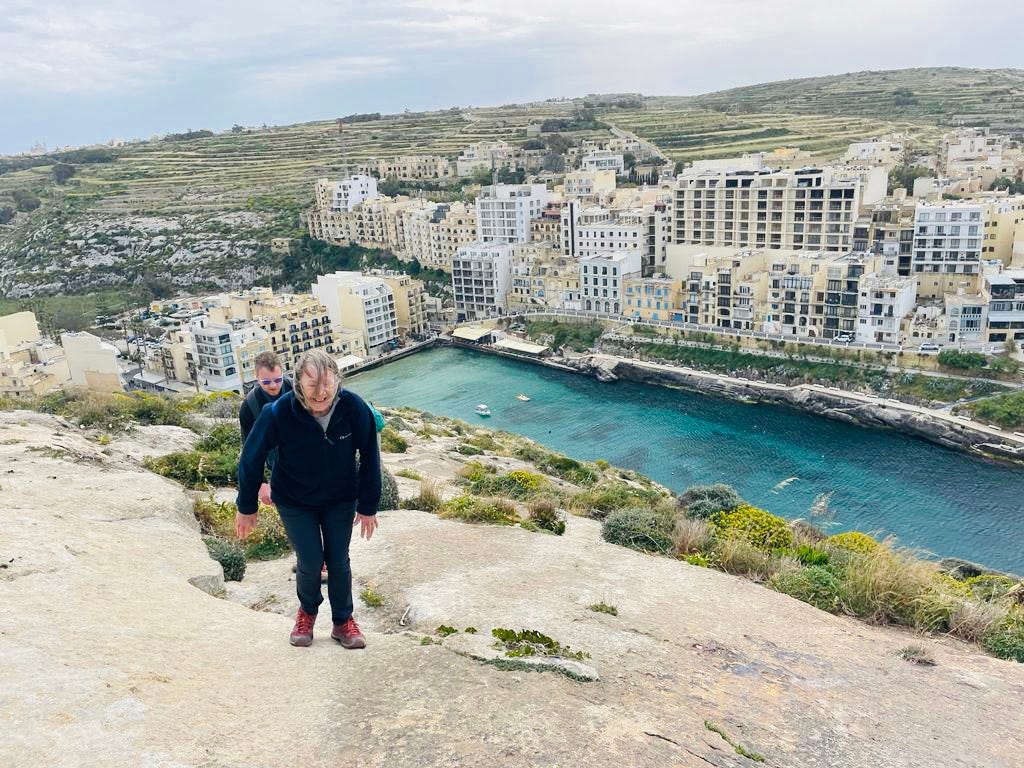
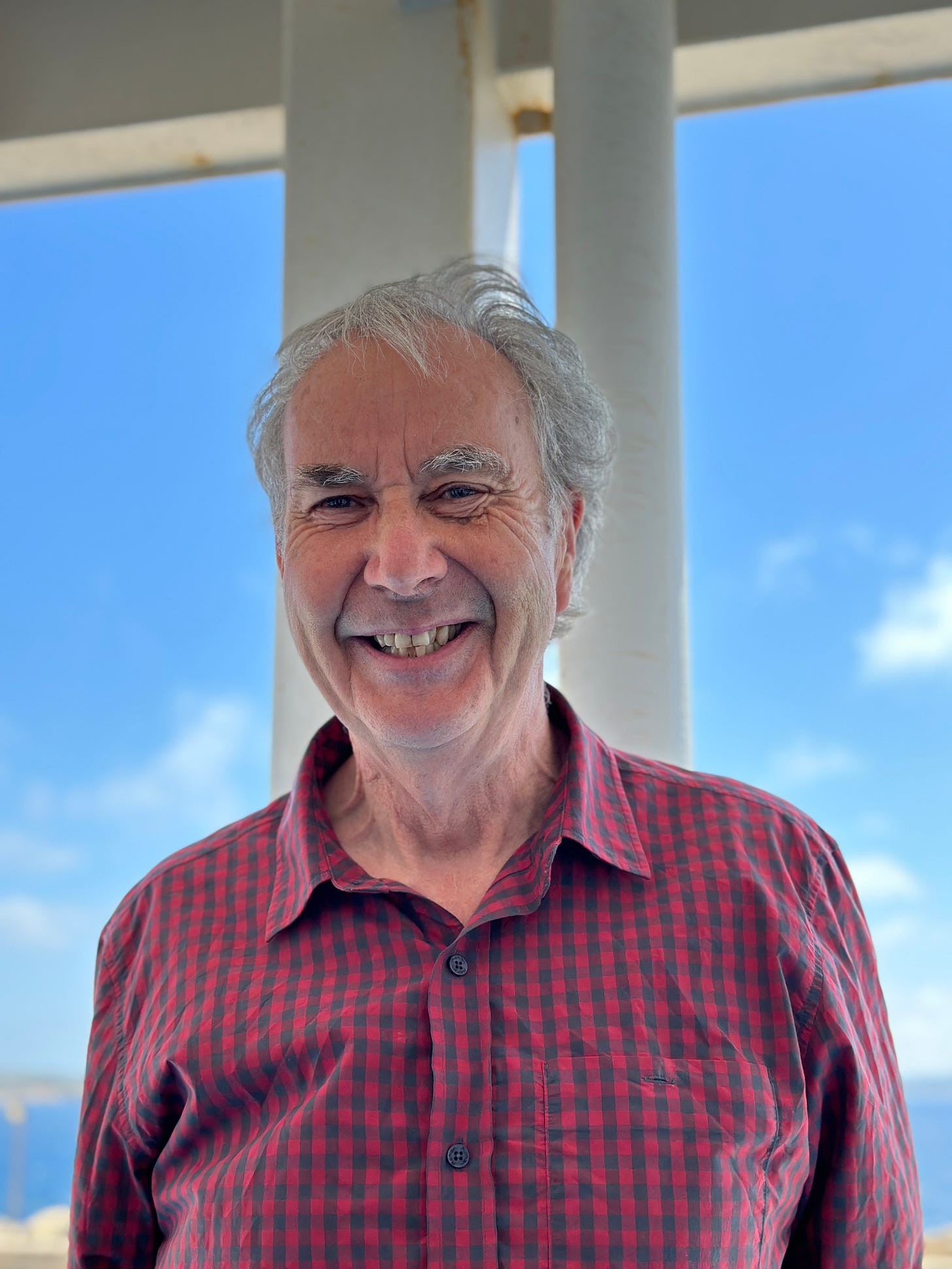
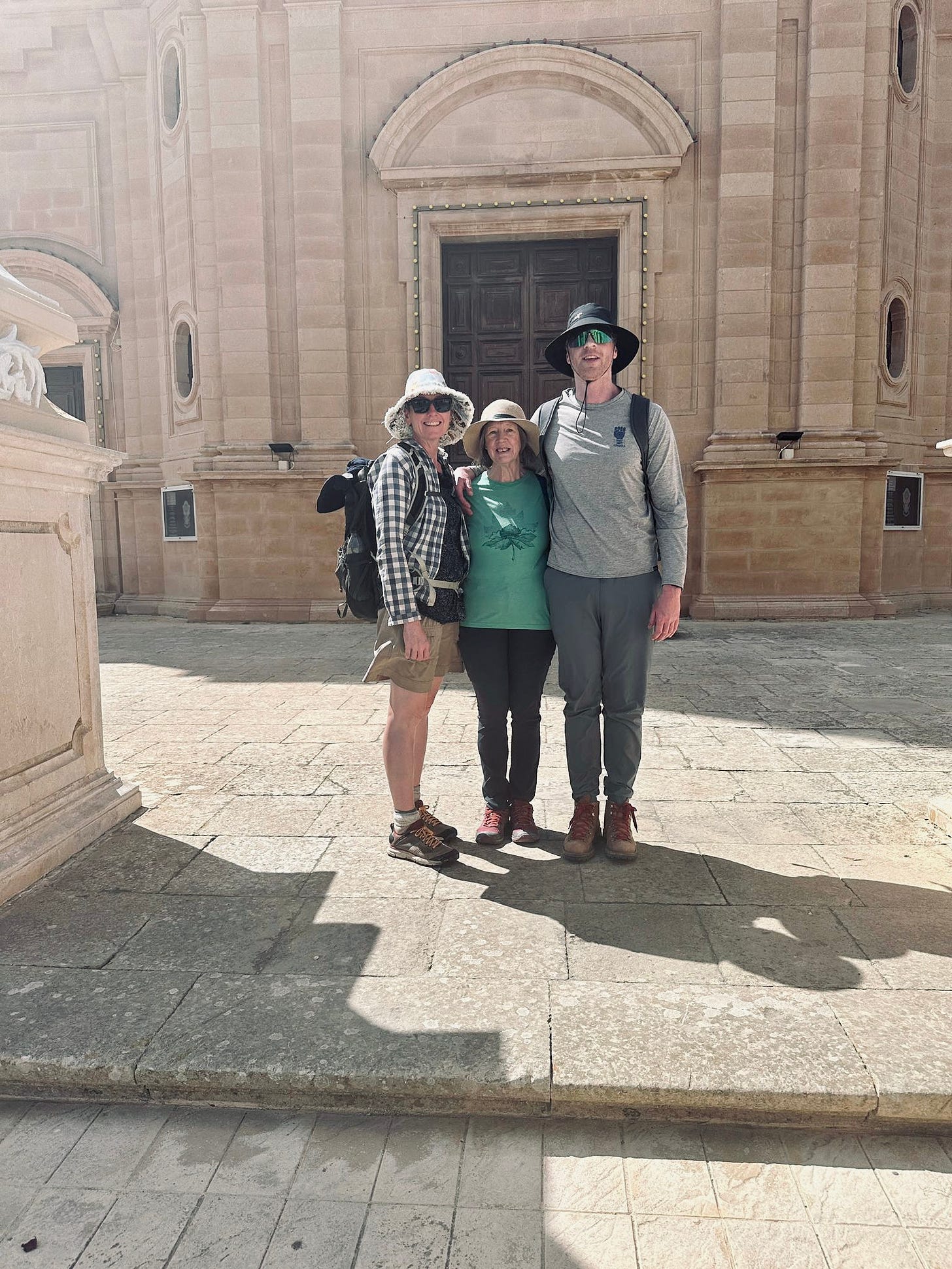
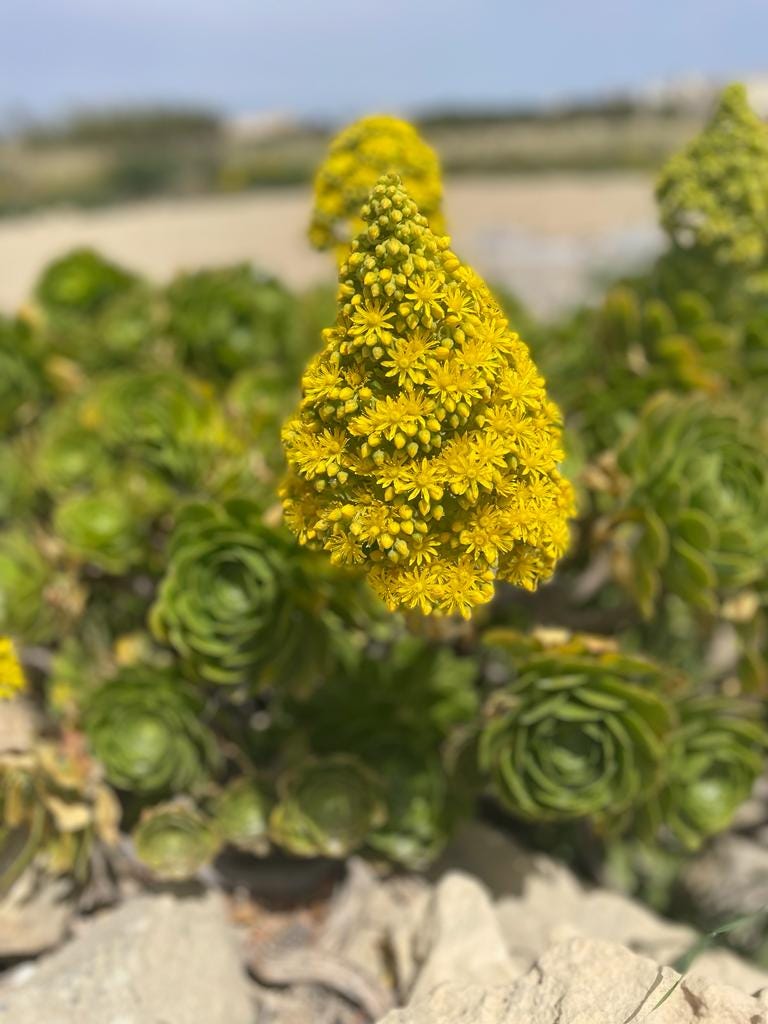
YES. One thing I'm trying to remind myself is to no put my shit on my parents. Not to feel bad for my dad because he's slowed down, for example. What's wrong with slowing down? Or feel heartbroken because they are finally real-deal looking "old." Like, what, should they NOT look old? So much of our perception of aging has to do with us, not with them. And things like slowing down and looking old are really unavoidable so best not to be scared of or bummed about them.
Great stuff Matt. Just had a lengthy conversation about the future, aging (I was 58 the other week) and how important friends and family are. Then coincidentally (serendipity ?) I spot your story and it’s pure magic. Be more Brian indeed ! :)